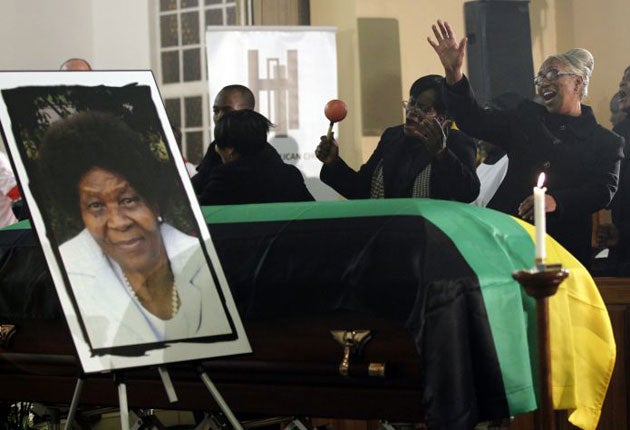South Africa mourns anti-apartheid veteran Sisulu

Your support helps us to tell the story
From reproductive rights to climate change to Big Tech, The Independent is on the ground when the story is developing. Whether it's investigating the financials of Elon Musk's pro-Trump PAC or producing our latest documentary, 'The A Word', which shines a light on the American women fighting for reproductive rights, we know how important it is to parse out the facts from the messaging.
At such a critical moment in US history, we need reporters on the ground. Your donation allows us to keep sending journalists to speak to both sides of the story.
The Independent is trusted by Americans across the entire political spectrum. And unlike many other quality news outlets, we choose not to lock Americans out of our reporting and analysis with paywalls. We believe quality journalism should be available to everyone, paid for by those who can afford it.
Your support makes all the difference.South Africans are mourning a woman celebrated for her role in the fight against apartheid, and for her nurturing of a new generation of leaders.
Crowds singing hymns and songs from the anti-apartheid era began gathering hours before Albertina Sisulu's funeral Saturday at a 40,000 seat soccer stadium in Soweto.
The service followed a week of national mourning during which flags were flown at half staff across South Africa and at its foreign missions. Officials of the governing African National Congress fanned out to every province to lead a series of memorial services. President Jacob Zuma, who is to deliver the eulogy, declared an official funeral with military honors — as close as possible to a state funeral reserved for presidents — "befitting for a leader of her stature."
Sisulu collapsed and died at her Johannesburg home June 2 at the age of 92.
Sisulu's husband, former ANC general secretary Walter Sisulu, was given a similar funeral after his death in 2003. Their love endured 26 years of separation while he was imprisoned for his anti-apartheid activities. Albertina Sisulu is to be buried next to her husband before a sweeping stone wall with a black marble plaque bearing his name at a cemetery on the edge of Soweto.
Walter Sisulu spent most of his time in prison on Robben Island alongside Nelson Mandela, whom he had brought into the ANC.
Mandela, 92, spoke at Walter Sisulu's funeral eight years ago, but since then has made fewer and fewer public appearances. The Mandela family on Saturday was marking the first anniversary of the death of Mandela's 13-year-old great-granddaughter Zenani, killed in a car crash on the way home from a soccer World Cup evening concert in Soweto.
While her husband was in prison, Albertina Sisulu raised the couple's five children alone, and was a mother figure to many other young South Africans, some relatives, some not.
Mandela, who was best man at the Sisulus' 1944 wedding, wrote in his autobiography of Albertina Sisulu's "wise and wonderful presence" in a Soweto house full of people and of fervent political talk.
While Albertina and Walter Sisulu lived their last years in a leafy Johannesburg neighborhood reserved for whites under apartheid, Saturday's funeral cortege started at their old house in Soweto, the black township synonymous with resistance to apartheid. The hearse and its convoy made its way to a stadium built in 1959 that has hosted sporting events as well as political rallies and funerals. Orlando Stadium was upgraded, its capacity nearly doubled, for the soccer World Cup last year. It was the stage for the opening concert of a tournament that allowed Soweto and the rest of South Africa to show the world how far they had come from a divided past. Soccer officials postponed one-year commemoration ceremonies to next month because of Albertina Sisulu's death.
Walter Sisulu's 2003 funeral and the 2007 ceremonies for Adelaide Tambo, the widow of Oliver Tambo — who led the ANC in exile while Mandela was imprisoned — prompted soul-searching among South Africans fearful of stumbling into the ordinary pitfalls of corruption and mismanagement after the extraordinary feat of bringing a peaceful end to brutal racist rule. Albertina Sisulu's death has been followed by a similar debate over whether her model of sacrifice and discipline has been abandoned. In a modern twist, some of the discussion has been led on Twitter by a Sisulu grandson.
Albertina Sisulu, who trained as a nurse, campaigned against apartheid and for the rights of women and children. She was a leader of the United Democratic Front, a key anti-apartheid coalition in the 1980s that brought together religious, labor and community development groups.
Albertina Sisulu's activism led to months in jail and restrictions on her movements. When her eldest son Lungi married in 1971, restrictions imposed on Albertina Sisulu by the government meant she could only watch the ceremony, held at a nursery school across the street, from her front yard. The new bride embraced her mother-in-law at the gate afterward.
Younger Sisulus followed their parents into national service. Daughter Lindiwe Sisulu is defense minister. Son Max Sisulu is speaker of the National Assembly.
Albertina Sisulu also served in parliament, taking a seat after the first all-race elections in 1994 and serving four years. She was given the honor of nominating Mandela for the 1994 parliamentary vote that made him South Africa's first black president.
Join our commenting forum
Join thought-provoking conversations, follow other Independent readers and see their replies
Comments